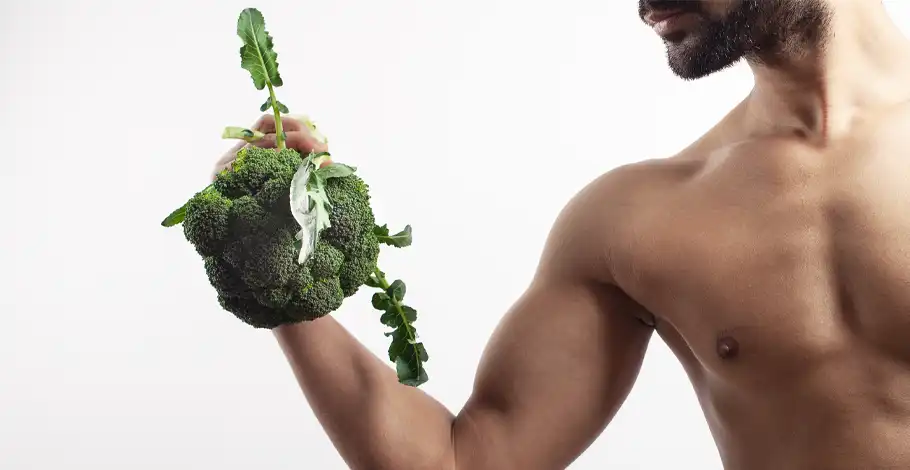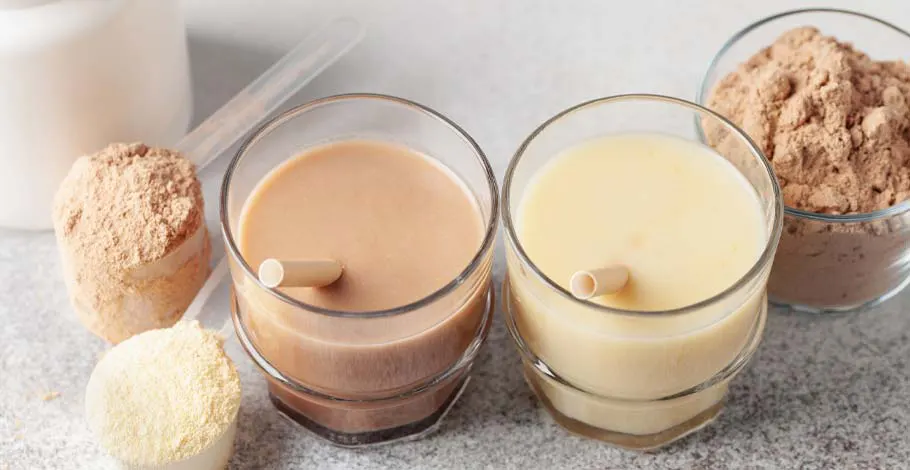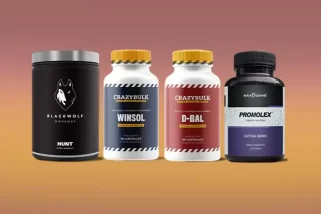Gaining muscle is a goal for many people of all ages, shapes, and sizes. Whether you’re looking to add some serious mass or simply add some muscle tone to your physique, it’s important to consume the right diet. Training is the most important element, but without a proper diet to back it up, results will be slow and underwhelming.

Eating a proper diet to support muscle building can already be difficult, but vegetarians can have a particularly difficult time since many essential nutrients are dense in animal-based foods. However, vegetarian or not, it’s entirely possible to get in adequate amounts of all the muscle-synthesis-supporting nutrients with a bit of foresight and planning. Vegetarian and vegan weight loss are more easily done, but keep reading to discover 7 vegetarian foods to eat every day to help support your muscle-building journey[1].
Nutrition Principles For Building Muscle
The nutrition principles for anyone following any type of diet with the goal of building muscle mass should be the same: eat an excess of calories and consume nutrients that aid in muscle synthesis. The body will require a surplus of caloric energy from food in order to create additional muscle. It’s also essential to eat a diet that supports training. This means it provides energy for workouts, helps refuel after, and helps with recovery[2].
Here are the most essential nutrients to prioritize for a muscle-growth-oriented diet.
Muscle Building Nutrients
- Protein
- Antioxidants
- B-Vitamins
- Magnesium
- Potassium
- Carbohydrates
Protein provides the building blocks for creating new muscles. Different protein components can also play a role in the creation of hormones and enzymes, so eating enough protein is not only important for building muscles but also for general health.
Antioxidants are helpful for muscle recovery, b-vitamins are essential for supporting metabolic processes that derive energy from food, and potassium is needed for hydration and proper nerve function. Magnesium is also important for several everyday functions to do with metabolism, the immune system, the cardiovascular system, and much more. It’s needed for muscle growth and proper recovery.
Last but not least is carbohydrates. Carbohydrates are the body’s preferred source of fuel to power through workouts, so they should not be restricted during muscle-building phases.
According to Katherine Black, Registered Nutritionist, foods like tofu, nuts, chick peas and quinoa are good sources of protein. If one consumes dairy then milk would be a great food source. Unlike animal based proteins, plant based proteins do not always contain all the essential amino acids (building blocks of protein) so different foods need to be combined to ensure sufficient amounts of all the essential amino acids are eaten.
Why Vegetarian Diets Can Be a Challenge
Thankfully, vegetarian foods are abundant in almost all of these essential muscle-building nutrients. Fruits and vegetables are rich in antioxidants, nuts are rich in minerals, and grains are an excellent source of carbohydrates. The main area of concern for vegetarians looking to build muscle is consuming enough protein[3].
Protein is generally much higher in animal foods, and the amino acid profiles are more favorable to building muscle than in animal sources. This means that vegetarians actually need to consume an overall higher amount of protein in order to gain adequate amounts of all the essential amino acids.
Those on an unrestricted diet should aim for 1.2-1.7 grams of protein per kg of body weight daily to build muscle, whereas those following a vegetarian diet should try to hit 1.6-2.2 grams of protein per kg of body weight daily. The following vegetarian foods are all excellent sources of protein. Though it’s unreasonable to eat all 7 of them daily, consuming at least a few daily will help you reach your daily protein goals.
7 Vegetarian Foods For Muscle Growth

1. Eggs
One of the best vegetarian-friendly foods to eat for muscle growth is eggs. They have an excellent amino acid profile that is particularly high in leucine, which is important for stimulating muscle growth. One egg contains 6 grams of protein and plenty of vitamins to boot. They’re even a decent source of potassium and magnesium.
Eggs are undeniably delicious and should be easy to incorporate into your diet regularly. Eat them scrambled for breakfast, add a fried egg to lunchtime sandwiches, or poach an egg to have over top of a bowl of stir fry at dinner. To increase their protein content even more, you could add additional egg whites (these can be purchased separately at most grocery stores) to mix in with whole eggs.
2. Cottage Cheese
Cottage cheese is another animal-based but vegetarian-friendly food. It’s a mild-tasting curdled milk product with a whopping 12 grams of protein per half cup, which only amounts to 100 calories. This makes it one of the highest dairy protein foods.
Try it as a base for dips, mixed into eggs or oatmeal, or simply topped with fruit. There are endless ways to eat cottage cheese since it has such a subtle flavor. There is also plenty of high-protein cottage cheese-based dessert recipes worth experimenting with.
3. Greek Yogurt
Greek yogurt is a tasty way to get 10 grams of protein with just a half-cup serving. It’s a thicker and sometimes tangier alternative to regular yogurt that packs far more protein for fewer calories.
You can use Greek yogurt in place of regular yogurt in almost any circumstance. Try topping it with fruit, adding it to smoothies, or using it as a creamy base for dips and sauces.
4. Protein Powder
Protein powder is popular for both vegetarian and non-vegetarian weightlifters. It’s an easy and portable way to ensure you’re fueling up with essential amino acids immediately after a workout, and it can be a great way to add extra calories in between meals.
Try adding protein powder to drinks, smoothies, baked goods, oatmeal, and more. Most protein powders are milk-based, which already makes them suitable for vegetarians, but there are also plenty of high-quality plant-based protein options on the market, which means even vegans or dairy-free vegetarians can enjoy them too.
5. Soy
Soy is a staple in many vegetarian diets and for good reason. Soy is one of the highest sources of plant protein by weight, and it offers a much more balanced amino acid profile than most other plant-protein sources[4].
High-protein soy foods include tofu, tempeh, and even soy milk. Try subbing in tofu crumbles in place of ground beef in savory dishes or frying up some tempeh to have overtopped noodle dishes.
6. Black Beans
Half a cup of black beans contains 8 grams of protein, which ranks them fairly high on the list of plant-based proteins. They can be conveniently used straight from a can, though it’s important to give them a thorough rinse first to avoid any bloating or digestive issues.
Black beans are great for making burrito bowls, using wraps with eggs and salsa, or simply throwing them into a bean salad.
7. Lentils
Lentils are small legumes with 9 grams of protein packed into a half-cup serving. They come in several varieties, and unlike most other beans and legumes, they’re all relatively quick to cook.
Lentils can be enjoyed as a ground beef replacement to make taco meat, burgers, lentil loaf, and much more.
Conclusion
With these 7 vegetarian foods at your disposal, it should be relatively easy to meet the protein demands needed for muscle building. By adding even a small amount of protein to each meal, it can easily add up to a balanced diet with all of the building blocks necessary for making gains in the gym.
4 sources
We review published medical research in respected scientific journals to arrive at our conclusions about a product or health topic. This ensures the highest standard of scientific accuracy.
[1] 6 Reasons You’re Not Losing Weight on a Vegan Diet & What to Do: https://welltech.com/content/6-reasons-youre-not-losing-weight-on-a-vegan-diet-what-to-do/[2] The Stress-Free Guide to a Healthy Lifestyle: https://pixelmags.com/guide-to-a-healthy-lifestyle/
[3] Antioxidants: https://www.betterhealth.vic.gov.au/health/healthyliving/antioxidants
[4] Quality of Soybean Products in Terms of Essential Amino Acids Composition: https://www.ncbi.nlm.nih.gov/pmc/articles/PMC8398613/#:~:text=The%20amino%20acid%20composition%20of,leucine%2C%20tryptophan%2C%20and%20lysine.








 This article changed my life!
This article changed my life! This article was informative.
This article was informative. I have a medical question.
I have a medical question.
 This article contains incorrect information.
This article contains incorrect information. This article doesn’t have the information I’m looking for.
This article doesn’t have the information I’m looking for.